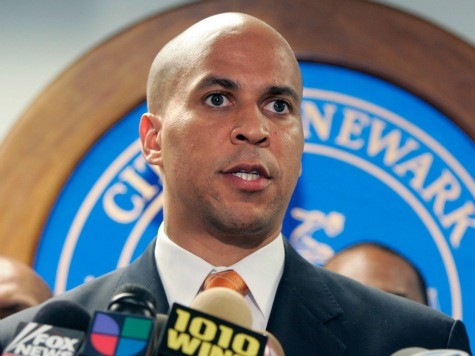New Jersey Senator Cory Booker has definitively lost The New York Times. The newspaper’s Michael Powell describes Booker in a profile Tuesday as a loquacious “absentee landlord” who let Newark rot from the core out, who has failed the children of the city, and who barely knew the most necessary details of his job.
In an introduction that almost mocks the essence of Booker, the politician, Powell claims Booker described his city as the “Wild West,” boasting about larger-than-life adventures when the mundane realities of who was stealing what money from the city should have captured more of his attention.
The most damning allegation in the piece–besides the general claim that there is something “Barnum and Bailey” about Booker’s approach to politics–is the fact that he never attended a single meeting of a corporation he ran, the Newark Watershed Conservation and Development Corporation, and never discovered the many acts of malfeasance occurring right under his nose. That corporation, Powell narrates, was a piggy bank for a number of Newark officials, and essentially produced nothing but tax excuses for individuals who had some extra money they could not explain. One of those individuals, one of Booker’s former law partners, was in possession of $400,000 of the corporation’s money without anyone being able to explain it. No contracts with the corporation were found under his name.
Then there are the conditions on the streets of Newark, which Booker apparently did little to amend. Booker was absent from a staggering number of important meetings while showing his face in poor neighborhoods and doing little else. Powell mocks Booker for distributing ice pops in poor neighborhoods like a “sweet absentee landlord” while the murder rate in the city skyrocketed. He doesn’t outright call Booker a clown, but suggests he might do well in the circus.
These criticisms of Booker are not new; New Jersey’s cantankerous Star-Ledger rightfully noted that Booker spent about 21% of his time in much of 2010 away from the city, visiting late night talk shows or promoting the city at public events, instead of doing important city work. The Ledger didn’t call Booker a circus act the way The New York Times did, even though they had even more to go on: the story of Booker’s imaginary friend “T-Bone,” an urban youth he claimed to have befriended who taught him about people from all walks of life. “T-Bone,” it turns out, was not a real person.
For now, the attacks on Booker from would-be friendly places like the Times do little to threaten his position in the Senate, arguably the perfect job for someone who enjoys showboating without actually doing anything productive. But it does threaten to weaken Booker’s delicately crafted brand, one of charisma with action in the face of staggering corruption requiring an ear ready to be lied to and suspensions of disbelief over the true state of the city of Newark.

COMMENTS
Please let us know if you're having issues with commenting.